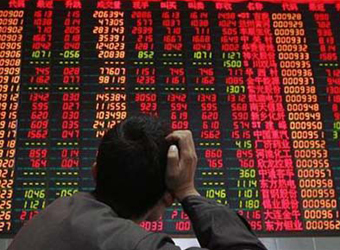Asian shares were in the red on Friday with little Christmas cheer in thin holiday trade, after the Dow Jones index once again fell short of the 20,000 mark.
Australia’s ASX 200 closed 0.14 percent lower at 5,627.90, undisturbed after police said they foiled a terror plot in Melbourne. Meanwhile, the New Zealand benchmark NZX 50 finished down 0.367 percent at 6,876.99. Both markets operated on shortened trading hours for the Christmas holiday.
In South Korea, the Kospi was flat at 2,035.90, but pharmaceutical shares rallied as the country battled its worst-ever case of bird flu. Hanmi Pharma jumped 4.56 percent and Daewoong Pharma rose 1.65 percent after 20 million birds, a quarter of the national poultry stock, were killed to contain the outbreak, Reuters said this week.
Chinese shares were low-spirited: the Shanghai composite was 0.94 percent lower at 3,110 while the Shenzhen composite fell 1.1 percent. Coal producers were laggards, with Datong Coal down 1.75 percent and Shanxi Xishan Coal 3.57 percent lower, tracking losses in coal prices.
Hong Kong’s Hang Seng lost 0.3 percent, weighed down by financials; Hang Seng Bank and Bank of East Asia lost more than 1 percent each.
Japanese markets were shut for the Emperor’s birthday.
Major U.S. indexes fell as investors digested a mixed bag of economic data. The Dow Jones industrial average was down 0.12 percent at 19,918.88, the S&P 500 closed down 0.19 percent at 2,260.96 and the Nasdaq composite ended 0.44 percent lower to 5,447.42.
In Southeast Asia, the Philippines’ PSEi Index lost 1 percent after the Banko Sentral ng Pilipinas held monetary policy steady on Thursday.
Philippine President Rodrigo Duterte took aim at the country’s central bank, telling its governor: “I will give you a whack,” Reuters reported on Thursday. Duterte also accused the Anti-Money Laundering Council, which is chaired by the central bank governor Amando Tetangco, for failing to support his crackdown on drugs by tracking the flow of drug money.
On the currency front, the dollar index, which tracks the greenback against a basket of currencies, continued to hover at 103.01, at a near 14-year high.
“The market still wants to own dollars as it winds down into Christmas and the New Year period,” said David de Garis, director of economist at National Australia Bank, in a note on Friday.
The yen was fetching 117.37 per dollar, while the Australian dollar/U.S. dollar stood at $0.7214, down from levels as high as $0.7499 last week. The Korean won meanwhile fell to 1203 per dollar, its lowest level since March.
U.S. West Texas Intermediate crude slipped 0.6 percent to $52.62 per barrel, while Brent futures dropped 0.5 percent at $54.78.
Spot gold was trading at $1,131.30 an ounce, near an 11-month low.
Source: CNBC


